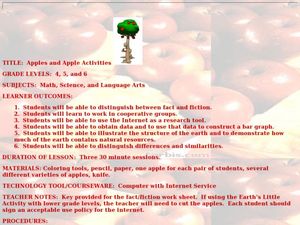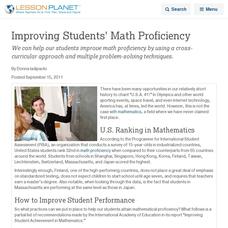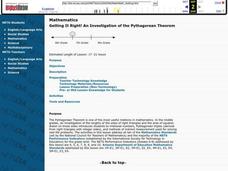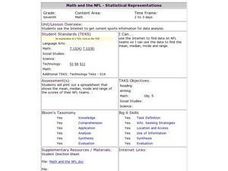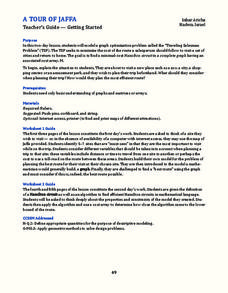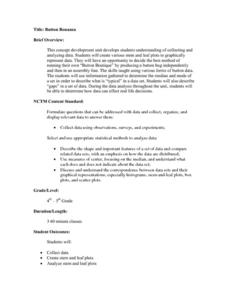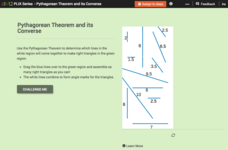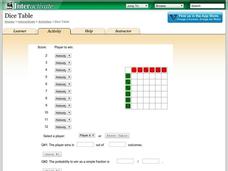Ms. Amber Nakamura's Mathematics Website
Algebra Project
What would your dream house look like? A cottage? A medieval castle? High schoolers enrolled in Algebra design the perfect house while using slopes to write equations for various aspects of the project.
Curated OER
Geometry, Pi, and Ancient Civilizations
By working together, pairs of students will complete a Pi webquest. Using the internet, they examine the ways people in the Ancient Civilizations of Egypt, Babylonia and Greece used Pi. To end the lesson plan, they review the concepts of...
Curated OER
Apples and Apple Activities
Students investigate apples. In this reading comprehension lesson, students read a book about apples then compare and contrast, make graphs, distinguish between fact and fiction and work in groups. Students work in groups...
Curated OER
Improving Students' Math Proficiency
We can help our students improve math proficiency by using a cross-curricular approach and multiple problem-solving techniques.
Curated OER
Getting It Right! An Investigation of the Pythagorean Theorem
Learners construct a variety of right triangles using a right-angled set square, cutting corners from pieces of paper or cardboard, and using dynamic geometry software. They measure the sides of these various right triangles and record...
California Academy of Science
Building Better Buses: Transportation Design Challenges
Scholars learn about a series of three challenges when they design a bus system for a small town. They determine the bus routes and then figure out the best type of fuel to use before considering the cost of going electric. Learners...
Curated OER
Math and the NFL - Statistical Representations
Seventh graders use the Internet to get current sports information for data analysis. They use their data to find the mean, median, mode and range. Students then place their data on a spreadsheet.
Curated OER
Predicting Temperature: An Internet/Excel Learning Experience
Third graders use the Internet (www.weather.com) to find the high temperature for our locale and the high temperature for another city around the world. They keep track of the temperature in these two locations for 10 days.
Curated OER
Architecture And Math
Students investigate the ties that architecture and math have in common. They focus on works of architecture in the world that is considered of great significance. Students use the internet to find building images from around the world....
Curated OER
USING MICROSOFT, POWERPOINT, WORD, EXCEL AND THE INTERNET TO CREATE A PRESENTATION
Explore the basic PowerPoint commands and options. They research information (including the WWW) related to an approved topic for presentation development. They create a presentation defined by specific criteria. They document research...
Curated OER
A Tour of Jaffa
Use the age-old Traveling Salesman Problem to introduce Hamilton circuits to your young travelers. Individuals then plan an efficient route to visit all the places they want to go.
Curated OER
Flicking Football Fun
Young mathematicians fold and flick their way to a deeper understanding of statistics with a fun, hands-on math unit. Over the course of four lessons, students use paper footballs to generate data as they learn how to create line...
Intel
Pedal Power
Show your classes the importance of mathematics in something as simple as bicycle design. The final lesson in the six-part STEM series has each group research a different aspect of the bicycle. Learners use mathematical formulas, linear...
Curated OER
Button Bonanza
Collections of data represented in stem and leaf plots are organized by young statisticians as they embark some math engaging activities.
West Contra Costa Unified School District
Correlation and Line of Best Fit
Computers are useful for more than just surfing the Internet. Pupils first investigate scatter plots and estimate correlation coefficients. Next, they use Microsoft Excel to create scatter plots and determine correlation...
Curated OER
Rating Systems
Your favorite sports team is ranked #1. How do the powers that be determine this rating? Learn how ratings are mathematically computed using probability concepts, from the Elo Rating System for chess to the Rating Percentage Index for...
Annenberg Foundation
Geometry 3D Shapes: Euler's Theorem
How do you get a theorem named after you? Euler knows what it takes! The third lesson of five asks pupils to use an interactive activity to compare the faces, vertices, and edges of seven different three-dimensional solids. They use...
Shodor Education Foundation
Whole Number Cruncher
Time to crunch the numbers! Young scholars use an interactive number cruncher to practice operations with whole numbers. They input a number and watch as the number cruncher produces the output and then use the data pairs to determine a...
Curated OER
Career Exploration Using HyperStudio
Eighth graders conduct research on various careers that are of interest to them. They conduct Internet research on a selected career choice, and create a nine card stack using HyperStudio to describe their career's salary, required...
Curated OER
A Model Solar System
If Earth is modeled by a grapefruit, what planet could be represented by a golf ball? This activity uses everyday and not-so-everyday objects to create a model of the Solar System.
CK-12 Foundation
Midpoint Formula
By selecting the resource, you're already halfway to understanding midpoints. Pupils use a slider to locate midpoints on the coordinate plane. They connect this conceptual understanding to the formula for the midpoint of a line segment.
CK-12 Foundation
Pythagorean Theorem and Its Converse
To be a right triangle, or not to be — that is the question. Scholars drag line segments in an Internet application to see if they form right triangles. Once they get the results of the activity, they connect them to the converse of the...
Shodor Education Foundation
InteGreat!
Take a great look at integration! Young scholars use an interactive to learn how to integrate a function. Learners input a function and view the integral as well as see a graphical representation.
Shodor Education Foundation
Dice Table
Convert a table to probabilities. Pupils set up the winning rules for the sums of two dice. Using the rules, the applet fills out a table showing the winners for each combination. Learners determine the probabilities of winning for each...




